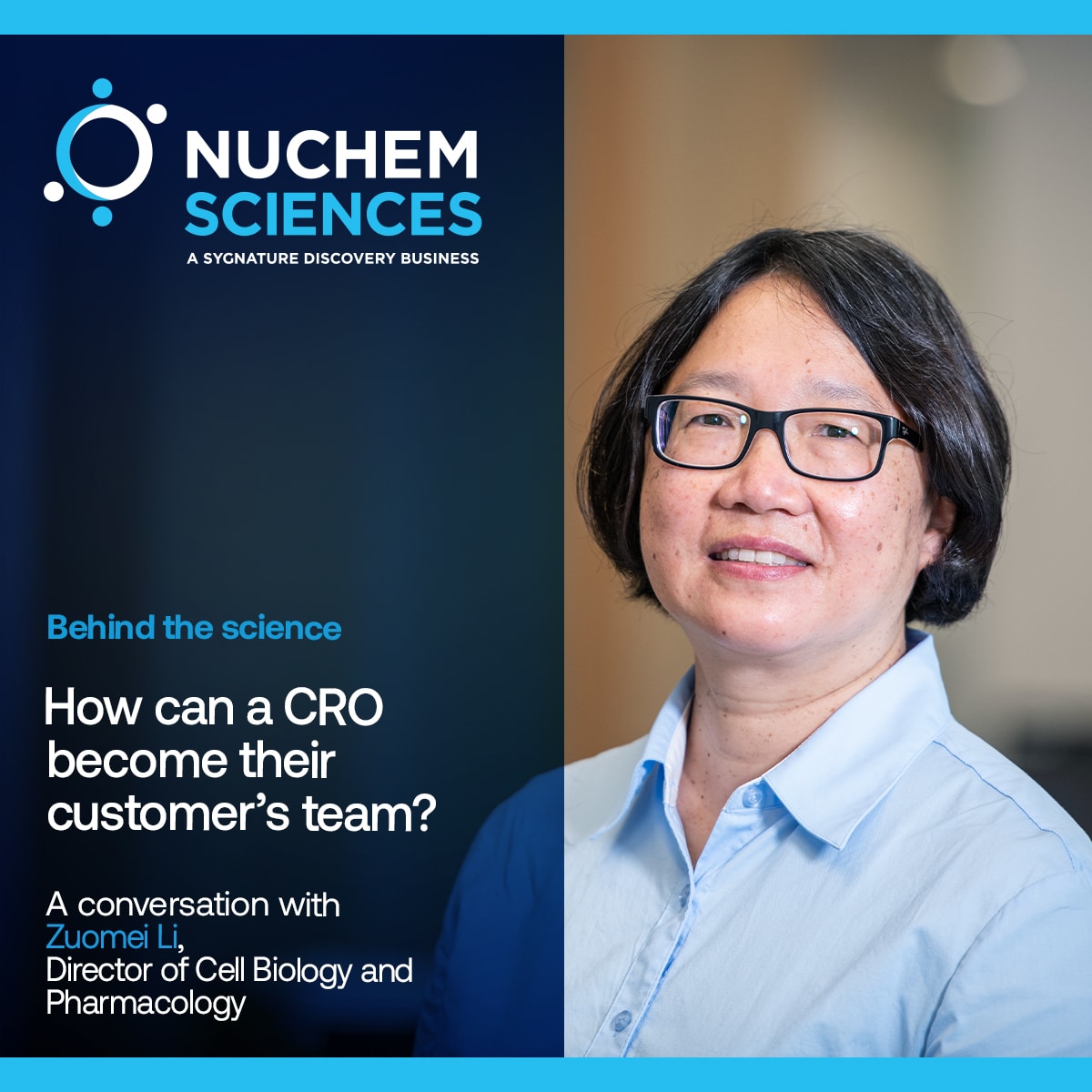How can a CRO become their customer’s team?
A conversation with Zuomei Li, Ph.D.
Zuomei Li has always been a creative thinker. In the face of widespread downsizing during the economic crisis, she created her own job by founding Amplia PharmaTek and building a team of experienced biologists.
Now, she brings her hardworking, entrepreneurial spirit and in-depth scientific knowledge to NuChem Sciences as Director of Cell Biology and Pharmacology.
Zuomei tells us how she set up her own CRO in the aftermath of the economic crisis and why creativity is important – even during the most routine of tasks.

What was it like to establish your own CRO?
I had been working at a biotech since I had finished my postdoc. I basically grew up in company from being a senior scientist to the senior director of biology. Sadly, the economic crash in 2009 meant that the biotech I worked at downsized the vast majority of their resources – including my team.
I thought: what should I do?
I had always thought about the possibility of doing my own thing and setting up a CRO. It seemed like a great idea for me because I loved research projects and have a lot of experience in drug discovery.
When I founded Amplia, I hired two of my former colleagues who I knew I could depend on. So, we started out over 10 years ago with two part-time employees. Gradually, it grew until we had around seven people when NuChem acquired us in 2019.
What were those early years of running a small CRO like?
During those 10 years, we worked really well with each client. My vision was that we should be a mobile team for the client. We would be there for them at all times.
One thing that I noticed is that the clients were often impressed by our high-end scientific expertise and the fact that we gave them suggestions that worked. This is the value we brought to the table, and is a vision that’s also key at NuChem.
Communication was really important to us as well. We wanted to provide the best service to the client by being responsive, and never leaving a client’s email unanswered! No matter what they asked me, I replied right away. In addition, our service was really high-quality.
This vision is still very much part of what we do at NuChem.
What convinced you to join NuChem?
After about 10 years of running Amplia, I was ready to hand over responsibility for operations and return to focusing on the science full-time. When NuChem approached me about an acquisition, I saw an opportunity to do that.
Because of the acquisition, NuChem now offers a very complimentary experience. NuChem has been traditionally very focused on chemistry and enzymology, whereas my expertise is in biology. That’s what makes a great CRO, having multiple services available.
What are the biggest challenges in your role?
I try to balance pleasing the client without placing too much pressure on the team. CROs work at a much faster pace compared to other pharma companies. You have to plan very well, foresee the challenges, deliver on time and use all your experience to minimize the risks.
That’s where recently graduated scientists who are new to CROs run into problems. They might have assumed CRO work was similar to academia, and that the result of a project isn’t their problem. Well, it is! If something doesn’t work, you need to figure out a solution within a certain budget and by a deadline.
When something works, the whole team feels rewarded. We all celebrate the good news and share it with the rest of the company. I’m really proud of the team I have here. All our people are really dedicated and enjoy working on projects.
And when you succeed, does it feel like you are doing something good for humanity?
In a CRO, we don’t always see the final result of what we work on. However, many of our clients keep us updated on the project or send us an email to tell us their drug has moved onto the next phase. Our team is always thrilled to hear news like this, and it encourages us as we continue on other projects.
Although we’re just one part of this process, we have to look beyond what our daily tasks are. That way, we feel our work is important and valued.
What sets NuChem apart from the competition?
The quality of the data we provide is superb. Our clients are always really happy with the quality of our service and the fact that we deliver on time.
When we work with a client, we are basically part of their internal team. That’s why our clients are so satisfied. Another thing I hear from clients is that we always go the extra mile to work on a problem and deliver a solution.
We also have a lot of experience in drug discovery, so they don’t need to explain what needs to be done.
Because NuChem is a little smaller than other North American CROs, does that allow you to be a bit more communicative with the client?
Yes, I think that definitely works to our advantage. In my view, we are our client’s mobile team. We are responsive, transparent and experienced.
Before the pandemic, we were also happy to welcome our clients at our facilities so they could see what we do. That is something that we can do again in the future!
In one word, how would you describe yourself?
I’m professional, dedicated and I will always try my best.
In terms of the science, I’m very creative and that’s probably one of my greatest strengths. I always try to solve problems.
You mentioned creativity. Many people might think drug discovery can be quite a repetitive science. Is there room for creativity in this field?
Some might say that drug discovery is boring, because there are a lot of compounds that we design and test routinely. However, parts of it are very creative. For example, we need to think creatively to design assays to look for other compounds.
For me, all science is creative. Even if it feels repetitive, you need to think deeply to find the reason why a compound failed in an assay. When you figure out what went wrong, it can be very rewarding.
There are two kinds of work that my team and I do – some of it is super creative and some is rather routine. So, I try to let everyone on my team do a bit of both. That way, everyone is getting exposure to different areas and learning new techniques.
What are the best personality traits for a good leader?
A good leader has to be visionary, organized and empathetic. You need to know when people are stressed and how to help them. Managing people is difficult, but good leaders should always lead by example. If you ask your team to work hard, you should also work hard.
You also need to be organized. If you’re not, it’s very difficult to lead a group in a CRO environment!
Words for the next generation
When it comes to mentoring young scientists, Zuomei has a few words of sound advice.
“Always do your best. Try to be creative and never stop believing in science,” she says.
“Knowing how to manage your time is also really important, and I try to pass those practical skills to young scientists I work with,” Zuomei adds. “I am also inspired by the words of Albert Einstein, who said: ‘Learn from yesterday, live for today, hope for tomorrow. The important thing is not to stop questioning.’ These are wise words to live by.”

Transform Ideas Through Science
A drug discovery and chemical development contract research organization.
News & Events
NuChem Sciences Inc.
2350 Rue Cohen Suite 201
Saint-Laurent, Quebec
Canada H4R 2N6
514 416 5659
